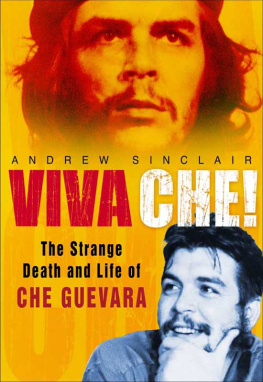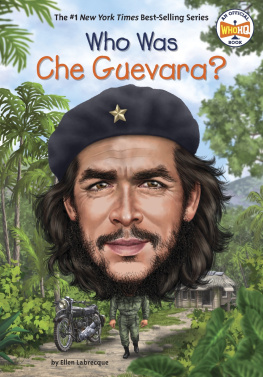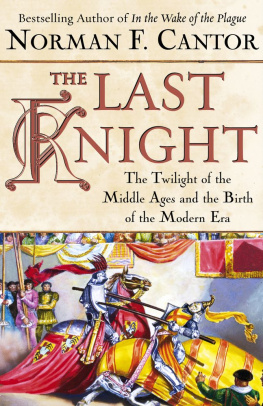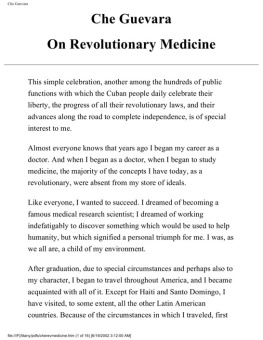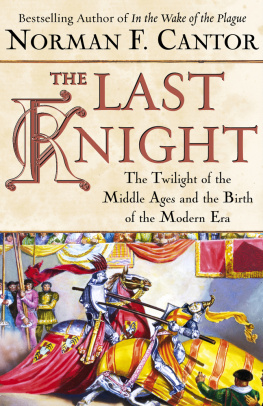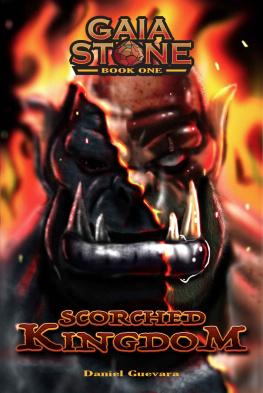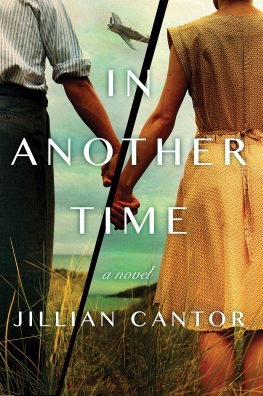Jay Cantor - The Death of Che Guevara
Here you can read online Jay Cantor - The Death of Che Guevara full text of the book (entire story) in english for free. Download pdf and epub, get meaning, cover and reviews about this ebook. year: 2005, publisher: Vintage Contemporaries, genre: Detective and thriller. Description of the work, (preface) as well as reviews are available. Best literature library LitArk.com created for fans of good reading and offers a wide selection of genres:
Romance novel
Science fiction
Adventure
Detective
Science
History
Home and family
Prose
Art
Politics
Computer
Non-fiction
Religion
Business
Children
Humor
Choose a favorite category and find really read worthwhile books. Enjoy immersion in the world of imagination, feel the emotions of the characters or learn something new for yourself, make an fascinating discovery.

- Book:The Death of Che Guevara
- Author:
- Publisher:Vintage Contemporaries
- Genre:
- Year:2005
- Rating:4 / 5
- Favourites:Add to favourites
- Your mark:
- 80
- 1
- 2
- 3
- 4
- 5
The Death of Che Guevara: summary, description and annotation
We offer to read an annotation, description, summary or preface (depends on what the author of the book "The Death of Che Guevara" wrote himself). If you haven't found the necessary information about the book — write in the comments, we will try to find it.
The Death of Che Guevara — read online for free the complete book (whole text) full work
Below is the text of the book, divided by pages. System saving the place of the last page read, allows you to conveniently read the book "The Death of Che Guevara" online for free, without having to search again every time where you left off. Put a bookmark, and you can go to the page where you finished reading at any time.
Font size:
Interval:
Bookmark:
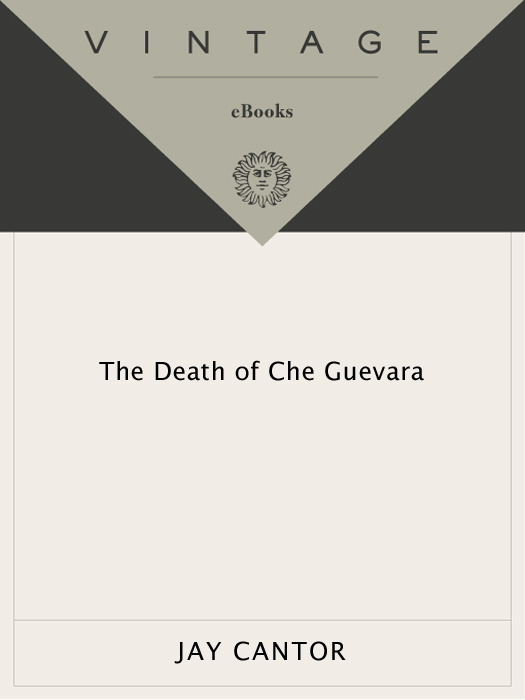
Acclaim for Jay Cantors
THE DEATH OF
CHE GUEVARA
Ambitious and provocative. An impressive achievement. For better or worse, no reader will close the book with the pillars of his political convictions unshaken.
The Atlanta Journal-Constitution
A lucid, compassionate work. A profuse and powerful first novel.
The New York Times
A fine book. Cantor has produced in his fiction a truly realistic Che Guevara.
St. Petersburg Times
Intriguing because it both penetrates and enshrines the aura that was Che, melding fact and fancy. [Cantor] immerses himself, capturing the flavor and feel of the small villages, the heat of the jungle, the oppression. It is a book about a man whose life may have been in vain but it also about an enigma, and it forms a decent tribute to the person who was that riddle.
Indianapolis Star
Create[s] a dense, impassioned portrait of Castros revolution.
Vanity Fair
This big novel is so lush, so intelligent, and arises so deeply from within the depths of the authors knowledge of Guevara that serious readers will be eager to spread the word about it. Guevara is evoked splendidly. The final picture is amazing in its intimacy.
Booklist
Cantor takes risks. His work is ambitious, brave and fascinating.
Houston Chronicle
A profound, immensely powerful book. The dilemmas of Che Guevaras life in the end become the dilemmas of political action and conscience in this century.
Frank Bidart
Complex but wholly convincing. What is unique here is that Jay Cantor has brought his North American sensibility to [the] celebration and he seems right at home.
Newsday
Cantor has created nothing short of a masterpiece. His prose is poignant and true and skillful and as hard-hitting as a bullet in the gut. This should be required reading not only for its literary imagery and for its powerful story, but also for its insight into todays unsettled Third World nations.
Tulsa World
Rich in political/psychological interplay and imaginative detail. The prose is assured, intensely focused.
Kirkus Reviews
A thrilling, masterfully written novel, especially in its portrayals of political desire.
Richard Poirier
Jay Cantor
THE DEATH OF
CHE GUEVARA
Jay Cantor is the author of two other novels, Great Neck and Krazy Kat, and two books of essays, The Space Between: Literature and Politics and On Giving Birth to Ones Own Mother. A MacArthur Prize fellow, Cantor teaches at Tufts University and lives in Cambridge, Massachusetts, with his wife Melinda Marble, and their daughter, Grace.
Also by Jay Cantor
FICTION
Great Neck
Krazy Kat
ESSAYS
On Giving Birth to Ones Own Mother
The Space Between: Literature and Politics
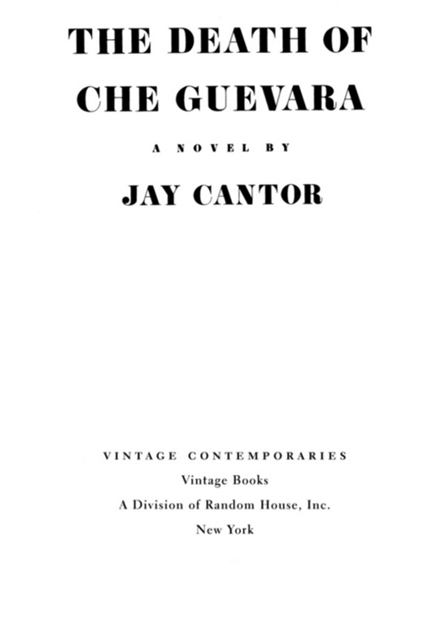
FIRST VINTAGE CONTEMPORARIES EDITION, JANUARY 2005
Copyright 1977, 1979, 1983 by Jay Cantor
All rights reserved under International and Pan-American Copyright Conventions. Published in the United States by Vintage Books, a division of Random House, Inc., New York, and simultaneously in Canada by Random House of Canada Limited, Toronto. Originally published in hardcover in the United States by Alfred A. Knopf, Inc., New York, in 1983.
Vintage and colophon are registered trademarks and Vintage Contemporaries is a trademark of Random House, Inc.
Portions of this book have appeared previously, in slightly different form, in the following publications: Canto, Raritan, and Triquarterly.
In addition, there are fragments from the translation of Che Guevaras Bolivian diaries from both Ramparts Magazine (July 27, 1968) and Daniel Jamess The Complete Bolivian Diaries of Che Guevara (Stein and Day), and fragments from the translations of Inca documents in John Hemmingss The Conquest of the Incas (Harcourt Brace Jovanovich, Inc., 1973). Life is not a walk across an open field is from Boris Pasternaks poem Hamlet.
Grateful acknowledgment is made to The Johns Hopkins University Press for permission to reprint excerpts from The Critical Difference by Barbara Johnson. Copyright 1980 by The Johns Hopkins University Press. Reprinted by permission.
The Library of Congress has cataloged the Knopf edition as follows:
Cantor, Jay.
The death of Che Guevara.
1. Guevara, Ernesto, 19281967 Fiction. I. Title.
PS3553.A5475 D4 1983
813.54
83-17487
eISBN: 978-0-307-77844-4
www.vintagebooks.com
v3.1
My part in this story
is for my father,
Alfred Joseph Cantor.
One of the thirty-six.

Contents
CRITICISM, SELF-CRITICISM
THE DIARIES OF THE BOLIVIAN CAMPAIGN

Dates
1927 The Communist Party of China leads an uprising in Shanghai, a general strike, an assault on the police station to gain arms for the rebels. The uprisingbadly coordinated, poorly armedmisfires, is put down, is (but what word for political error, historical misfortune might make vivid so many deaths?) by Kuomintang troops. Thirty-five years later, Regis Debray, a French theoretician, gathers up the dead from the streets of Shanghai, orders them into the cunning of history, draws a lesson, a moral: But the blood shed in Shanghai must not be inscribed in the deficit column of the Revolution, as though it were the result of an error of judgment the theoretical proof that an isolated urban insurrection cannot achieve victory in a semi-colonial country had to be made in practice. (The country surrounds the city.) 1928 Profitable outlets cannot be found for the reinvestment of profits made by the industrial monopolies. Money is drained from the economy or wagered pointlessly. Inventories build. These manufactured things, things that too few can buy, stand against their makers, menace them. 1929 Panic on Wall Street, and in the City of London. Argentina, whose wealth is beef sold to the industrialized countries, discovers again that it does not make history, but, like a terrified dreamer, merely suffers events. 1930 Irigoyen, the blind, now unpopular President of Argentina, sits alone in an unlit room. He is overthrown by the Army under General Uriburu. In China, Chiangs troops move against the Communist bases in Kiangsi, Fukien, Hopeh. Gandhi gaily walks two hundred miles across India to the Arabian Sea. In defiance of British law, he picks up some salt from the shore. His gesture enters the imagination of the Indian masses, is completed by them, becomes an action. Thousands join Gandhi in defiance, illegally dry seawater on the rooftops for salt, hawk it openly in the streets. Nonviolent marchers move towards the Dharasana Salt Works, the British monopoly. (Their chests are naked, their ribs exposed.) Native policemen, goaded on by their British officers, shatter the marchers heads with steel lathes. The marchers do not even raise their arms against the blows. Enraged by this passivity, this restraint, the police fracture mens skulls, kick and stab marchers in the testicles. 1931 The Roca-Runciman Agreement is signed: the British to buy Argentine beef; the Argentines to purchase British manufactured goods. Few national industries are developed in Argentina. Through this, and other measures, the large landowners secure their power over the country. 1934 The Long March of the Chinese Red Army begins, away from Kiangsi and into northern Shensi, away from the cities and deep into the countryside. (The country surrounds the city.) Tens of thousands of soldiers die on the march, from lack of food, from lack of warm clothing, from lack of boots. (This is not the sort of world where a fellow can take his boots off.) In Cuba, Sergeant Fulgencio Batista leads the overthrow of the government of Grau San Martin. Those who protest are tortured and then shot. (Batista himself sets the style for his administration: He announces his coup to a meeting of his fellow officers. A colleague objects. Batista puts his arm around the mans shoulders, and shoots his fellow officers head off with his own service revolver.) The United States extends recognition to the new government. 1935 Hitler defies the Versailles Treaty, and establishes military training for all Germans. The Comintern, in the Soviet Union, calls for formation of Popular Front governments. The Soviet Union announces that when the capitalist jackals fight, it will side with the capitalist democracies against the Fascists. 1936 General Franco leads a rising of dissident troops against the Spanish Republican government. Irregular forces of Anarchist miners and P.O.U.M. (Partido Oberero de Unificacion Marxista) resist the advance of the Fascists. A Revolutionary Committee comes to power in Barcelona. The Germans send ten thousand troops to the aid of Franco. The Fascists begin a massive aerial bombardment of soldiers and civilians, of the men, women, and children of Madrid. In Argentina, the Radical Party wins the congressional elections. An Argentine Popular Front is organized. It is a hopeful time (for even bad marriages seem full of possibility at the start). Victory in the next presidential election seems certain. In the Soviet Union the show trials of Zinoviev and Kamenev begin. (They will be executed by firing squad as agents of Trotsky and spies of the Nazis.) 1937 Fraudulent elections are held in Argentina. The army candidates defeat the Popular Front. General Ortiz, a diabetic, takes power. His fellow officers find him too weak towards the opposition. He will resign in favor of General Castillo. The Soviet Union sends advisers and guns to the Republicans in Spain. The Communist Party reads the Agenda of History for the Spanish people. The time for a Communist revolution is not yet. There can be only one leadership, one direction, one vanguard party. Negrin takes over as head of the Republican government. He declares, The War must be won before the Revolution can be carried further. By command of the party, the P.O.U.M. is suppressed, its leaders jailed or killed. The miners militias are not sent arms or supplies, are left to die before the Fascist advance. Other socialist, but non-party, units are dissolved, and their men are reintegrated into brigades of the regular Army. Their officers are jailed. Throughout the Left there is a pervasive confusion about what is happening in Spain, an icy wind that leaves each person isolated, afraid to move for fear of touching something unintentionally, while his limbs are tender. Had the Communists betrayed the miners so as not to disturb the digestion of their new allies, the Paris bourgeoisie? Or were the miners treacherously undisciplined cowards, the class enemy in one of the many disguises that only the Party can penetrate? The confusionthe lack of clarityis worse for the Left (the Argentine left) than even the worst knowledge might have been. It invades all their certainties, makes them unsure of all they thought they knew, ironic towards themselves, paralyzed. 1938 The Communist Party of Cuba begins cooperation with the Batista government. The Munich Pact is signed. Germany occupies Austria. The Soviet show trials of Bukharin, Rykov, and Yagoda end with their sham confessions. 1939 The Soviets sign a ten-year nonaggression pact with Germany. (No longer able to locate the hero in this movie, one twists uncomfortably in ones seat.) Franco takes Barcelona, executing tens of thousands of Loyalists. During the Spanish Civil War seven hundred thousand men are killed in battle. Fifteen thousand people die (that solemn word!) in aerial bombardment. Three hundred thousand are executed or assassinated. (You and he are of the same family. He must be annihilated utterly.) 1940 Batista makes himself President of Cuba. (A days work for the dictator: he chooses his clothes, ties his tie, puts commas in letters, reties his tie.) 1941 Argentina, its army officers sympathetic to fascism and opposed to Britain and the United States, refuses to join with the other American republics in breaking with the Axis. Yugoslavia surrenders to Germany, but partisan guerrilla units continue to fight in the mountains. Chinese Communist guerrillas and regular units lead the resistance to the Japanese invaders. 1943 In Argentina a group of German-trained army officers overthrow the government of General Castillo. General Ramirez becomes head of state. The Ministry of Education is turned over to a fascist and anti-Semite, Gustavo Zuirria. He purges all democratic teachers from the schools. Catholic education is restored. Students protest (even in the mountain province of Cordoba, a place good for ones asthma but far from the mtropole). The German Sixth Army surrenders at Stalingrad. Six hundred thousand soldiers and civilians die in the battle, or are destroyed by cold and famine. 1944 The United States, its attention elsewhere, relaxes its hold on Latin America, for a time; a nationalist revolution, led by the army, begins in Guatemala. In Argentina, Colonel Peron becomes Minister of Labor. He raises wages and gains the support of the grandsons of Italian and Spanish immigrants, his shirtless ones. 1945 Colonel Peron is forced to resign by Argentinas generals, who fear his growing power. They imprison Peron on Martin Garcia Island. His wife, Evita, an actress, rallies his supporters, leads a demonstration in Buenos Aires of millions of workers. They take over the streets and squares of the city. The unions call for a general strike. Peron is freed. Ho Chi Minh, who led the guerrilla forces against the Japanese in Indochina, proclaims the independence of Vietnam from France. He begins a regular war against the French, to free Vietnam, and make all of Indochina one state. France has the Republic of Cochin China declared at Saigon. 1946 Fidel Castro, an ambitious man, is elected President of the Association of Cuban Law Students. Peron is overwhelmingly elected President of Argentina. The French bombard the port and people of Haiphong. 1947 Castro, an adventurous man, joins an expedition to liberate the Dominican Republic from the tyrant Trujillo. The expedition fails, most of the band is killed, but Castro, a fortunate man, escapes. Civil war spreads throughout China, the Communist forces against those of the Kuomintang. Peron, in conflict with Great Britain and the United States, purges the courts of all but the most loyal Peronistas. After years of mass unrest, nonviolent demonstrations, and sporadic rioting, the British find that it is no longer in their interest to remain in India as its colonial rulers. The colony is freed. 1948 Fidel Castro, a convincing man, attends the Conference of Latin American Students in Bogota, Colombia. During the conference Eliecer Gaitan, a popular Colombian leader, is assassinated by rightists. There is a vast rising in the city. It is said later (by the United States ambassador to Cuba) that Castros voice was heard over the radio, announcing, inciting, instructing, cajoling the rising. The demonstrations are put down. 1949 The Argentine Constitution is changed, so that Peron can succeed himself. The Communists are victorious in China. (The country surrounds the city.) Mao Tse-tung heads the new government. 1950 War begins between the Korean Communists and the Koreans who have the support of the United States. 1951 Paz Estenssoro, a leader of the nationalist and anti-feudal forces, is elected President of Bolivia. But the election is annulled by the army. (Pieces of a new interpretation: In Latin America power belongs to the army. And to whoever can purchase the army. This thesis will be inscribed, and reinscribed, on the body of the Latin American masses.) The Vietnamese Communists return to guerrilla tactics against the French. (The country surrounds the city.) 1952 In Cuba, the Ortodoxos party wins the general election. Batista (now General Batista) annuls the elections and takes power again. (He has telephone conversations taped all over the island and sent to him. What do people say about him? How do they live?) Fidel Castro, a courageous man, brings charges against Batista in the Cuban courts, accusing him of violating the Constitution. (Castros gesture, his tactic, will become theory: a peoples war cannot be begun until every hope of legal redress has been exhausted.) General Perez Jimenez takes over Venezuela by coup. In Bolivia a force made up of Indians, peasants, miners, and cadre of the Movement for a National Revolution smash the regular army and bring Paz Estenssoro to power. (Pieces of a new interpretaion: if power belongs to the army, or those who can purchase the army, then only another armed force can defeat the regular army, gain power for the people. In Latin America the peasant will be the base of the Revolution.) In Argentina, Perons policies, the corruption of his government, and the opposition of the industrialized countries have crippled the Argentine economy. Land reform begins in China. In Guatemala, Colonel Jacobo Arbenz Guzman signs a land-reform bill expropriating 225,000 acres of United Fruit Company land, for distribution to the peasantry. The United Fruit Company, and the State Department of the United States, express their displeasure. The United States takes over the financing of French forces in Vietnam. (Greece, Macedonia, Rome, Spain, Portugal, France, Great Britain, as all schoolchildren know, had empires.) In Argentina, Eva Peron, Protector of the Forsaken, Defender of the Workers, Guiding Light of the Children, dies. Peron, perhaps not sensitive enough to the countrys feelings, takes up with a series of attractive women. 1953 Fidel Castro, a reckless man, leads a hundred twenty people in an attack against the Moncada barracks in Santiago. They plan to seize arms, and by their actions spark a general uprising. The attack occurs during the confusion of carnival time. The rebels, disguised in carnival costumes, had planned to emerge from the crowd, and move on the barracks. Badly coordinated, poorly armed, the insurgents lose their way in the streets of Santiago. Those who make it to the barracks are defeated by the soldiers. The rebel reinforcements, wandering in the unfamiliar streets, never arrive. Most of the insurgents are captured, tortured, and then killed by the police. Fidel Castro, a fortunate man, escapes to the mountains, and is not discovered until after the Bishop of Santiago has interceded to stop the executions. Fidel Castro, isolated, is tried in secret for the rebellion. A rhetorical man when menaced, Castro delivers a speech to the court, concluding that History will absolve me. He is sentenced to fifteen years in prison on the Isle of Pines. The United States, no longer diverted, has recovered economically from the war. The State Department, and the CIA, begin operations to overthrow the government of Guatemala. They train mercenaries in Honduras for the invasion. Bolivia nationalizes its tin mines and passes land-reform laws that are acceptable to the United States. The Vietnamese Communists have an army now of 125,000. The French have 230,000 soldiers in Vietnam. The main center of French strength is the huge entrenched (and doomed) camp at Dien Bien Phu. 1954 Batista again declares himself President of Cuba. (He takes the commas out of letters, reties his tie. He plays canasta for hours, sitting on the edge of his bed. He has the television stations show more horror movies, his favorites.) Peron begins an attack against the Catholic Church and its power. There is an insurrection in the city of Algiers against the French. The insurrection is quelled. (Certain theoretical proofs must be made in practice.) The war against the French will continue in the countryside for seven more years. In Vietnam Dien Bien Phu falls, overrun by the Communist forces. (The country surrounds the city: a childrens nursery rhyme.) Peron makes all labor decrees of his government binding on the now powerless unions. General Castillo Armas, leading his army of CIA-trained mercenaries (their symbol: the cross and the sword), overthrows the nationalist government of Guatemala. 1955 Batista, hoping to increase his popularity, establish some legitimacy, declares a general amnesty for political prisoners. Fidel Castro, a free man, goes to Mexico, Costa Rica, and the United States, to organize Cuban exiles and prepare an armed landing. In a suburban house near Mexico City, he meets an asthmatic Argentine doctor, Ernesto Guevara. They talk through the night. Peron bars Catholic education in the schools. He is excommunicated by the Pope. Peron signs an agreement with Standard Oil. Eva gone, and his economic programs in shambles, enthusiasm for Peron wanes in working-class quarters. They wish him well, but they do not wish to die for him. He is overthrown by the air force and the navy. Demonstrators for Peron in the public squares of Buenos Aires are bombed by air force planes. The Geneva Accords are signed, ending the fighting in Vietnam. The United States does not sign. Elections called for by the accords are never held. The United States establishes a puppet regime in Saigon. 1956 Fidel Castro, a bold man, announces in Mexico, This year we will be free or else martyrs. His boat, the
Font size:
Interval:
Bookmark:
Similar books «The Death of Che Guevara»
Look at similar books to The Death of Che Guevara. We have selected literature similar in name and meaning in the hope of providing readers with more options to find new, interesting, not yet read works.
Discussion, reviews of the book The Death of Che Guevara and just readers' own opinions. Leave your comments, write what you think about the work, its meaning or the main characters. Specify what exactly you liked and what you didn't like, and why you think so.

